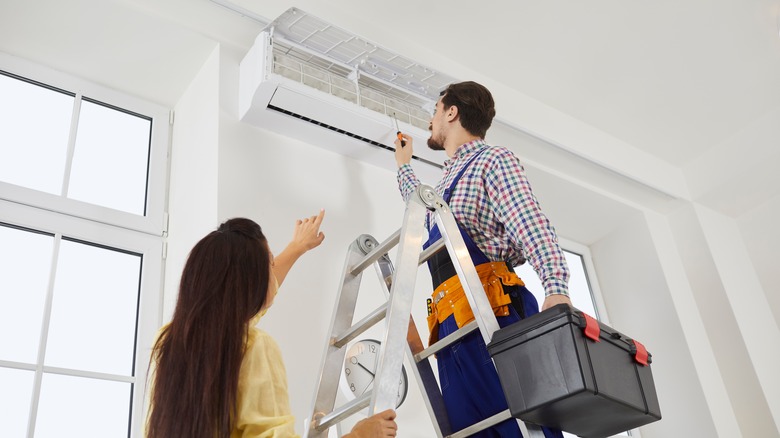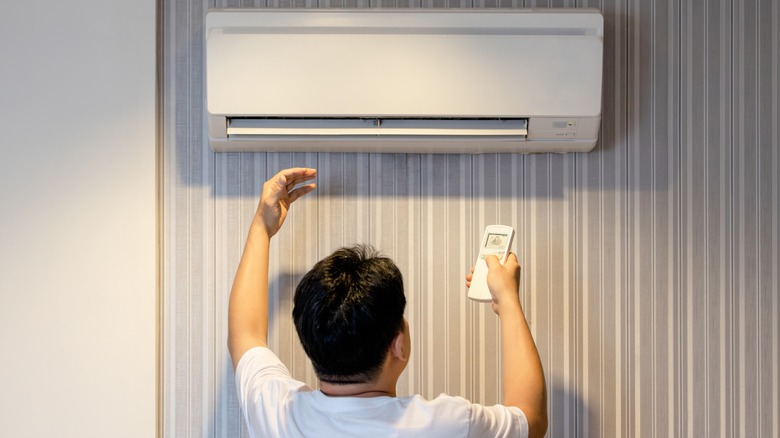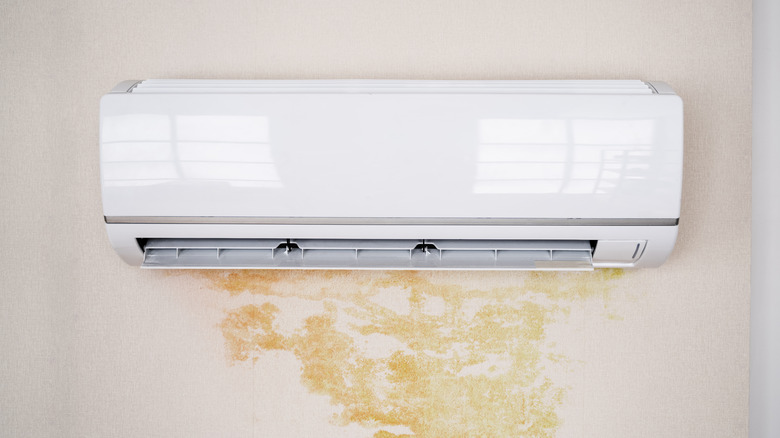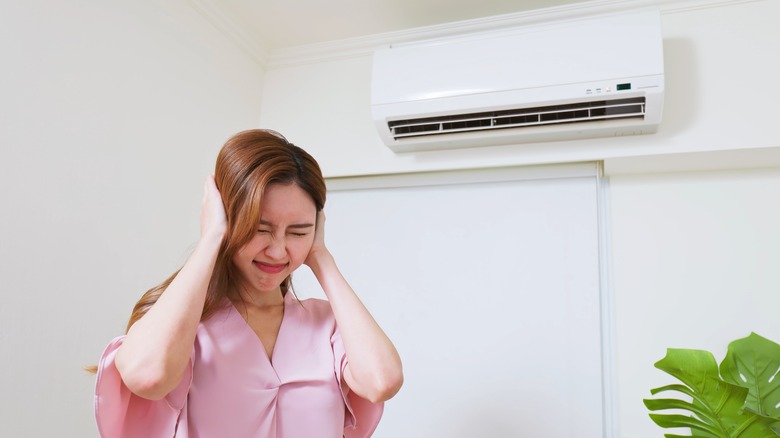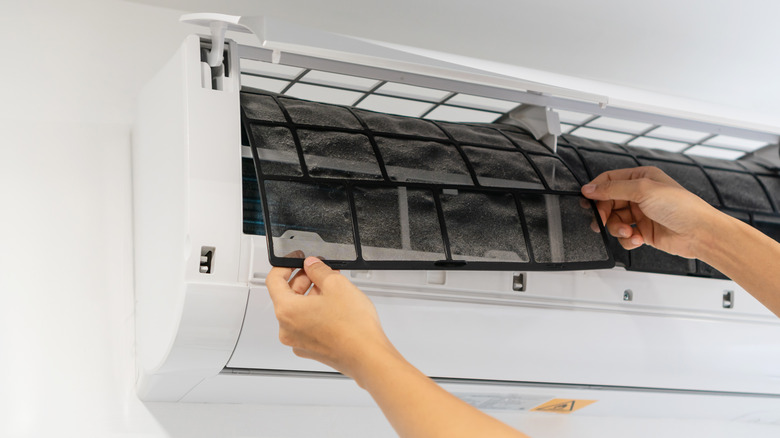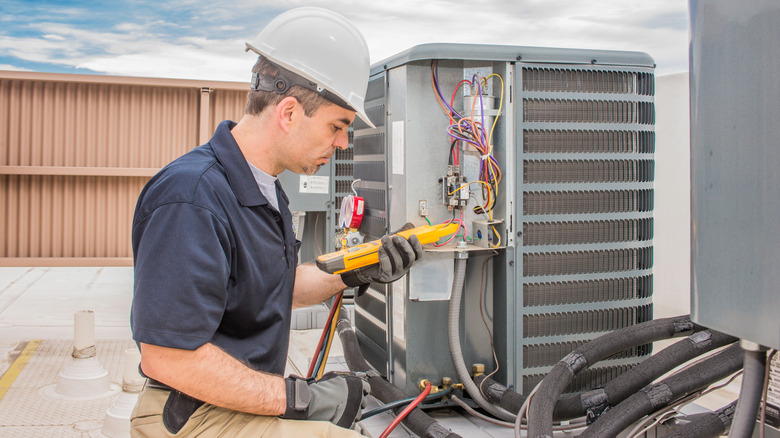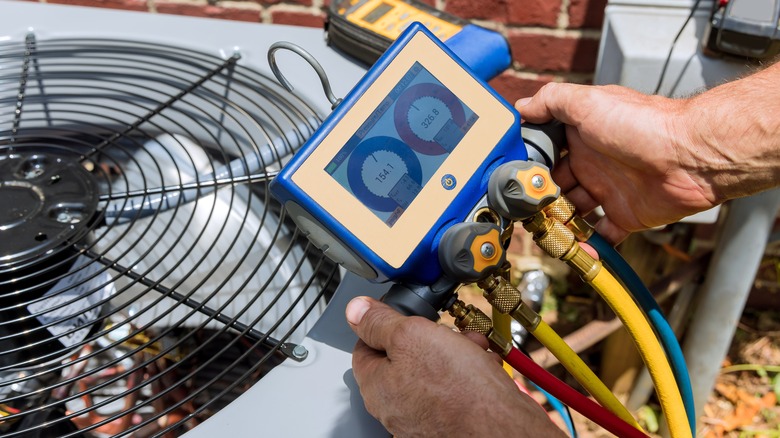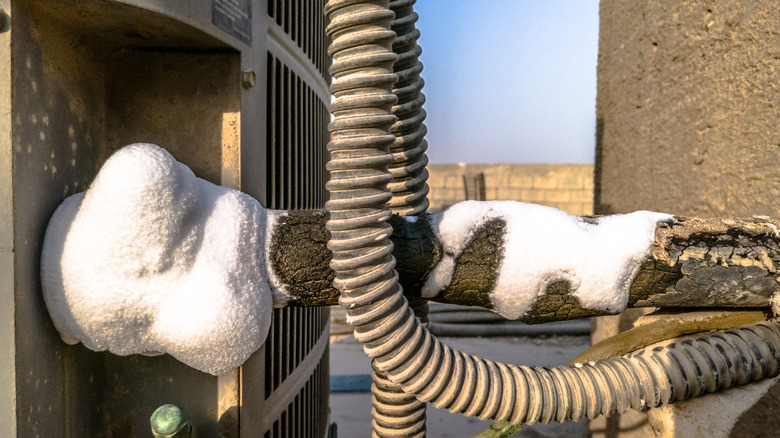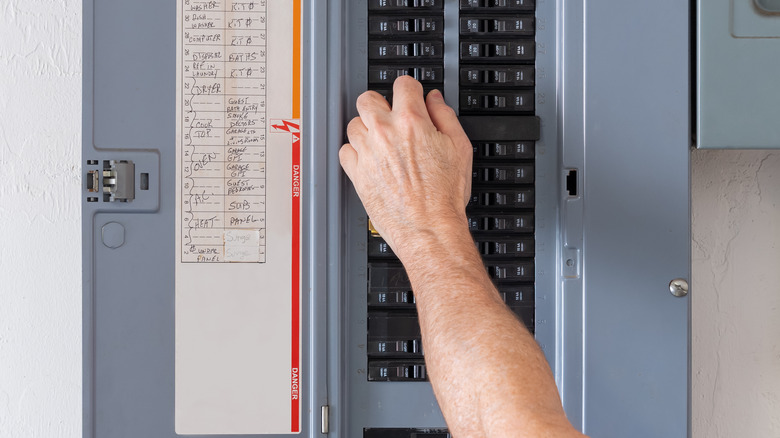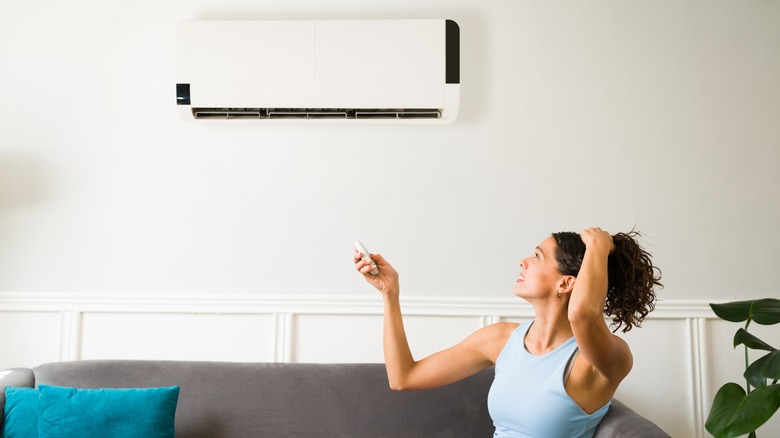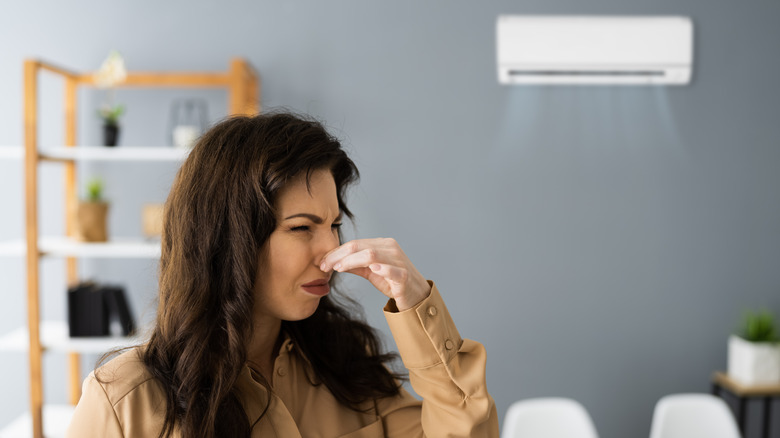The Most Common Air Conditioning Failures (And How To Repair Them)
The air conditioner is a masterpiece of technological ingenuity that tames inclement weather conditions. Until it doesn't. Air conditioning systems, regardless of the type, have their own set of unique and, often unexpected, problems. And since the majority of American households have at least one air conditioner unit installed, chances are you have experienced failures firsthand. This is especially frustrating if it happens at the peak of summer when you need the cooling breezes the most.
Air conditioning failures come in all forms and degrees of severity. Some, including dirty air filters, drainage problems, and a freezing condenser coil, can be easy to fix without having to look for a technician. But others, such as a damaged compressor and capacitor failure, would call for a professional to handle them. These usually imply that one or more parts of the unit are malfunctioning and should be replaced. Between those two extremes, other problems of mild severity might pop up. Then, you can either put on your technician hat and try to fix it yourself or take the costlier, yet easier, route of calling an expert. Read more to find out the most common air conditioning failures and how to fix them.
The thermostat isn't functioning correctly
After setting the thermostat to the ideal temperature, you usually have to wait for the mandatory first few minutes before the gentle, cool air flows in. But when that doesn't happen and the air in the room continues to be warm, humid, and sluggish, then something is off. You check the AC unit only to find out that the air it blows out is slightly cool at best, or balmy at worst. The air conditioner is not playing tricks on you. You may just have a malfunctioning thermostat.
Thermostat malfunctioning is a more common air conditioning failure than many people think. It can have a simple reason behind it, such as the batteries are dead and need to be replaced. But other more sinister causes could lead to thermostat damage. These include broken wires, corrosion, loose screws, or simply dirt build-up. If the thermostat uses batteries, that's the first thing to check. Replace them and see if that fixes the problem. Otherwise, you might have to call a professional to sort out the issue or replace the thermostat altogether.
Water is leaking from the unit
It's not normal for water to leak out of the air conditioner either indoors or outdoors. But as you might expect, such mishaps can happen for a wide variety of reasons. If the water leakage is indoors, then the condensate drain pipe, where the moisture inside the AC unit safely drains out in the pan, might be clogged. Fungal build-ups that thrive in humid conditions are often the culprit behind the clogging. Switch off the air conditioner then use the manual to locate the condensate drain pipe. Mix equal amounts of vinegar and water or bleach and water and pour the liquid inside the drain pipe to kill the fungi and unclog it. However, if the drain pipe isn't clogged, then the condensate pump might be malfunctioning, and you'd need to have it replaced.
If the water is leaking from the compressor outside, then the issue could be damaged condensate pans, poor installation of the unit, or the seal has gone bad. Unfortunately, none of these problems should be fixed by consulting the manual and watching a YouTube video. You should turn off the AC unit and give the technician a call.
The air conditioner is making noises
Air conditioners and noise don't, or at least, shouldn't, mix. No matter what type of air conditioner you have, a quality, well-functioning one should purr like a kitten. When loud noises come out of the AC after you turn it on, you may have a serious issue on your hands. These noises, when they happen, come in different tunes and pitches. A faint bubbling noise tells you that there may be a refrigerant leak, or that the unit has a lot of moisture build-up. A persistent clicking sound means that the capacitor may be malfunctioning, or the fan has debris and grime build-up. Meanwhile, a loud grinding sound is an omen that either the motor or the compressor is about to fail.
These noises can be serious warning signs. And you shouldn't trust your ear to distinguish between a faint bubbling noise and persistent clicking, let alone diagnose the cause of the failure. As with other serious issues regarding the air conditioning system, a professional should handle this one. They can determine the source and type of the noise and the best fix for such an issue.
The air filter is clogged
The AC air filter has one job to do: screen the airflow for specks of dust, lint, pet hair, and dead bugs and keep them from cycling through the house. Over time, the filter mesh can become clogged with these pollutants. It's a slow and steady process, but its impact is decisive. The airflow increasingly diminishes, and the AC takes longer to cool down your home. This, in turn, has other undesirable effects, including but not limited to a spike in the electricity bill, frozen evaporator coils, and acceleration of the wear and tear of the air conditioning unit.
Air conditioner filters come in two types: replaceable or reusable. Replaceable options can only be used once and you should replace these air filters every one to two months depending on the quality of the air in your home and whether anyone has allergies. But if you have a reusable air filter, sometimes called a washable air filter, you should clean it every few months. Switch off the AC and open the front panel to remove the air filter. Wash it with a mixture of warm water and detergent, then rinse it thoroughly.
The capacitor is failing
Sometimes the air conditioning system seems to be working. The condenser is humming, and the fan is whirring as it should, but the temperature indoors isn't decreasing. When the AC is running but fails to regulate the temperature, it's time to investigate the capacitor. These come in two varieties: start capacitors and run capacitors. A failing start capacitor doesn't provide the surge in power necessary to get the system running, while a bad run capacitor switches off the unit in the middle of a cooling cycle. The reasons for such failures vary but can be summed up as normal wear and tear, exposure to a heat source, and frequent power spikes.
AC capacitors are built to last and you can get around 20 years of service out of them, provided that they're not exposed to the sun or power surges. But when they fail, they could blow up and bring about damage to the other components. Call a technician and have them test the capacitor with a multimeter to determine if it's broken, in which case, it should be replaced.
The air conditioner refrigerant is leaking
Leaking refrigerant, aka freon, is just as deceptive as a bad capacitor. In both cases, the compressor and the fan motor are working just fine, but the temperature indoors doesn't meet the thermostat setting. However, in the case of the leaking refrigerant, there's a serious health risk involved since the chemical is highly toxic. Some telltale signs that the AC refrigerant is leaking include frozen evaporator coils, dwindling cooling performance, and a hissing or gurgling sound coming out of the condenser.
Freon can leak from the AC unit due to shoddy installation or corrosion of the copper tubes, either because of friction or exposure to acidic chemicals. The system is also more likely to spring a leak if it's an old model where wear and tear has undermined the integrity of its components. Whatever the source, a leaking refrigerant is a serious system failure and you shouldn't try to fix it yourself. Stay away from the leaking AC to limit your exposure to the chemical and call a professional to handle it safely.
The evaporator coil freezes often
One name that keeps popping up whenever something goes wrong with the air conditioning system is the notorious evaporator coil and how it's prone to freezing. When ice covers those coils, the AC's cooling performance degrades, and the time it takes it to reach the set temperature becomes longer. The A-shaped evaporator coil with panels and coiled metal tubes is found near the system fan.
Unobstructed airflow is the key to a functional evaporator coil and a high-performing AC unit. If the system fan malfunctions, the airflow will slow down and the refrigerant inside the tubes will trigger ice to form on the coils. Or if dust and grime cover the coils, they could insulate the surface and freezing ensues. Yet another reason for poor ventilation could be a clogged air filter. To fix the issue, turn off the AC and use a hairdryer to melt the ice. Then clean or replace the air filters. You should also have the HVAC system serviced regularly to keep the fan in top shape and maintain the integrity of the coiled tubes.
The circuit breaker trips when the AC turns on
It's hard to miss this failure. When you switch on the AC or when the compressor kicks into gear to start a new cooling cycle, the circuit breaker will trip. As with other air conditioning problems discussed here, there's more than one source for this failure. It could simply be a bad or too-weak breaker that's at fault. Dirty condenser coils, clogged air filters, or a malfunctioning fan motor can all increase the power consumption of the unit and cause the fuse to blow. But the origin of the tripping could be more ominous and pricier when you have a failing compressor or a burnt-out motor.
Apart from the clogged air filters which you could clean or replace yourself, the rest of the issues should be handled by a professional. An electrician could replace or upgrade the circuit breaker just for the AC system, thus minimizing the recurring problem of overloading. As for the damaged motor, compressor, and fan motor, as well as the dirty condenser coils, a certified technician should look at them and suggest the best ways to repair or replace the malfunctioning parts.
The air conditioner is not turning on/off
The air conditioner operational failures are not limited to poor performance and high energy consumption. Sometimes the AC won't turn on at all. Most likely, this is an electrical problem, so checking the circuit breaker and flipping the switch off and on may solve it. But it could also be a problem with a clogged air filter, so you should replace it or get it cleaned up. A malfunctioning condensate pump could also prevent the unit from working on account of moisture build-up. Consult the user manual to troubleshoot it for your specific model.
The other side of the problem is when the AC won't turn off. Most air conditioners have cooling cycles that last between 15 to 20 minutes at a time. If the system keeps running nonstop, check the thermostat and make sure it's working properly. The temperature might be set too low, so adjusting it a few degrees higher may prevent the system from running around the clock. If none of this works, take a closer look at the condenser and condenser coils for dirt build-up, and inspect the evaporator coils for signs of ice. Defrost them as needed and have a full inspection performed on the unit.
The air conditioner stopped working and the thermostat went blank
The AC could switch off unexpectedly in the middle of a cooling cycle for any one of the reasons listed above. But the extra symptom, the thermostat going blank, adds an unwelcome twist to the plot. A common root of this failure is moisture backup in a clogged condensate line. When the moisture fills up the drain line, it gets diverted into a secondary pan. This pan has a float switch that cuts the power for the condenser, the thermostat, and the blower motor when the drained moisture reaches a certain level.
Algae and dirt pile up in the condensate line are the two guilty parties behind this snag. Before you call a contractor, locate the secondary drain pan which is usually fitted under the evaporator coil. If the pan is full of water, that will confirm the clogged condensate line diagnosis. Your technician will likely use compressed air to clear up the clogged line.
A funky smell comes out of the air conditioner
Sometimes, the AC develops an affinity for emitting odors that range from off-putting to hazardous. A moldy scent is easy to track down to fungi and mildew growths in the drain pan, on the evaporator coils, or inside the ducts and vents. Wash the drain pan and the coils with soap and water and replace or clean the air filters. To clean any mold buildup in the ducts and vents, you'll need the help of a professional.
A persistent burning smell coming out of the vents is cause for alarm. It usually indicates that the components of the unit are overheating and could soon fail. Calling a technician is the right course of action here. On the other hand, a rotten smell wafting through the open vents is usually nothing more than a dead rodent that's found its way inside the ducts and will need to be removed. But the same cannot be said about a chemical- or nail polish-like smell oozing out. This is a sign of a Freon leak. Switch off the AC and call a technician immediately.

